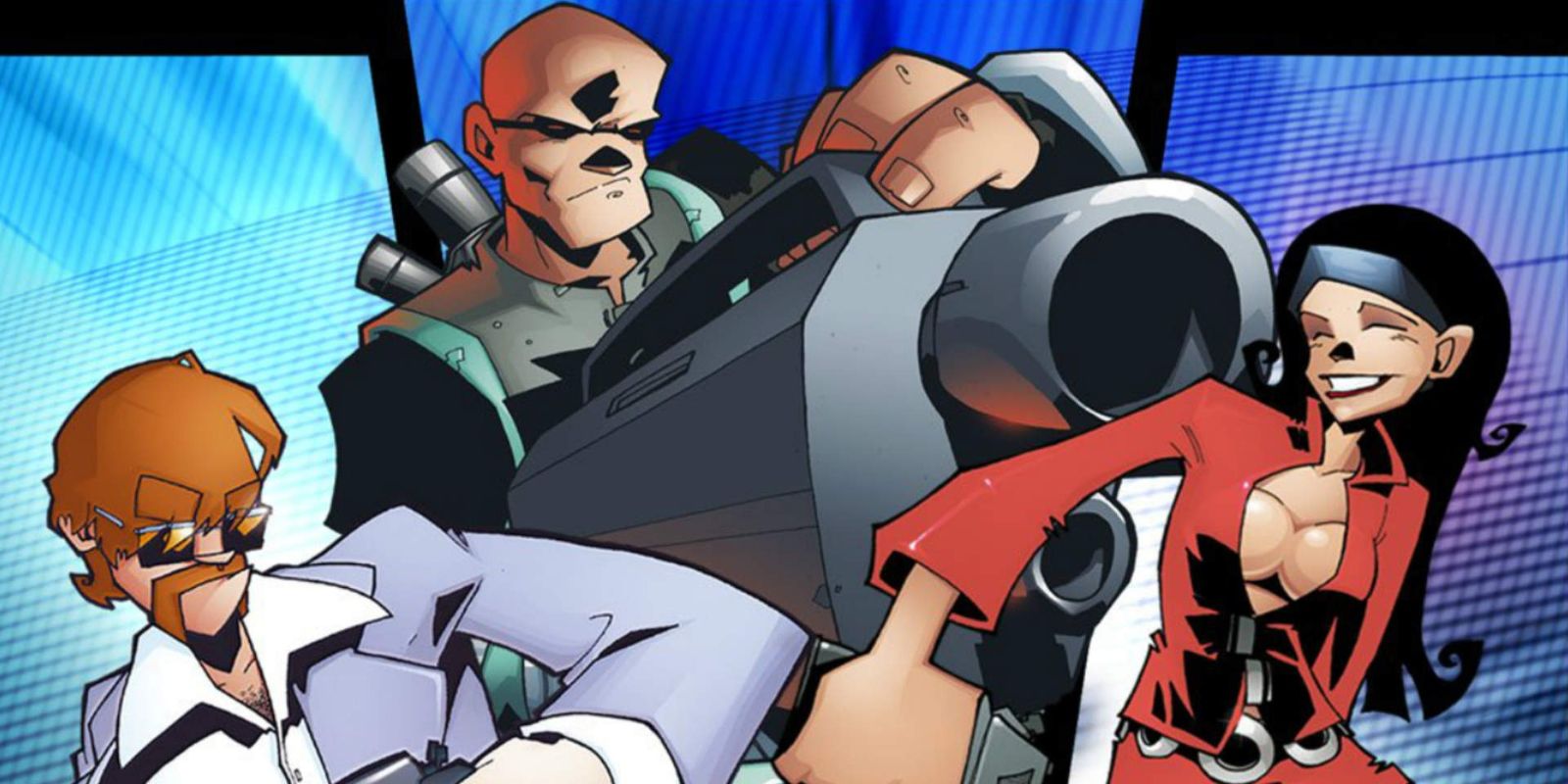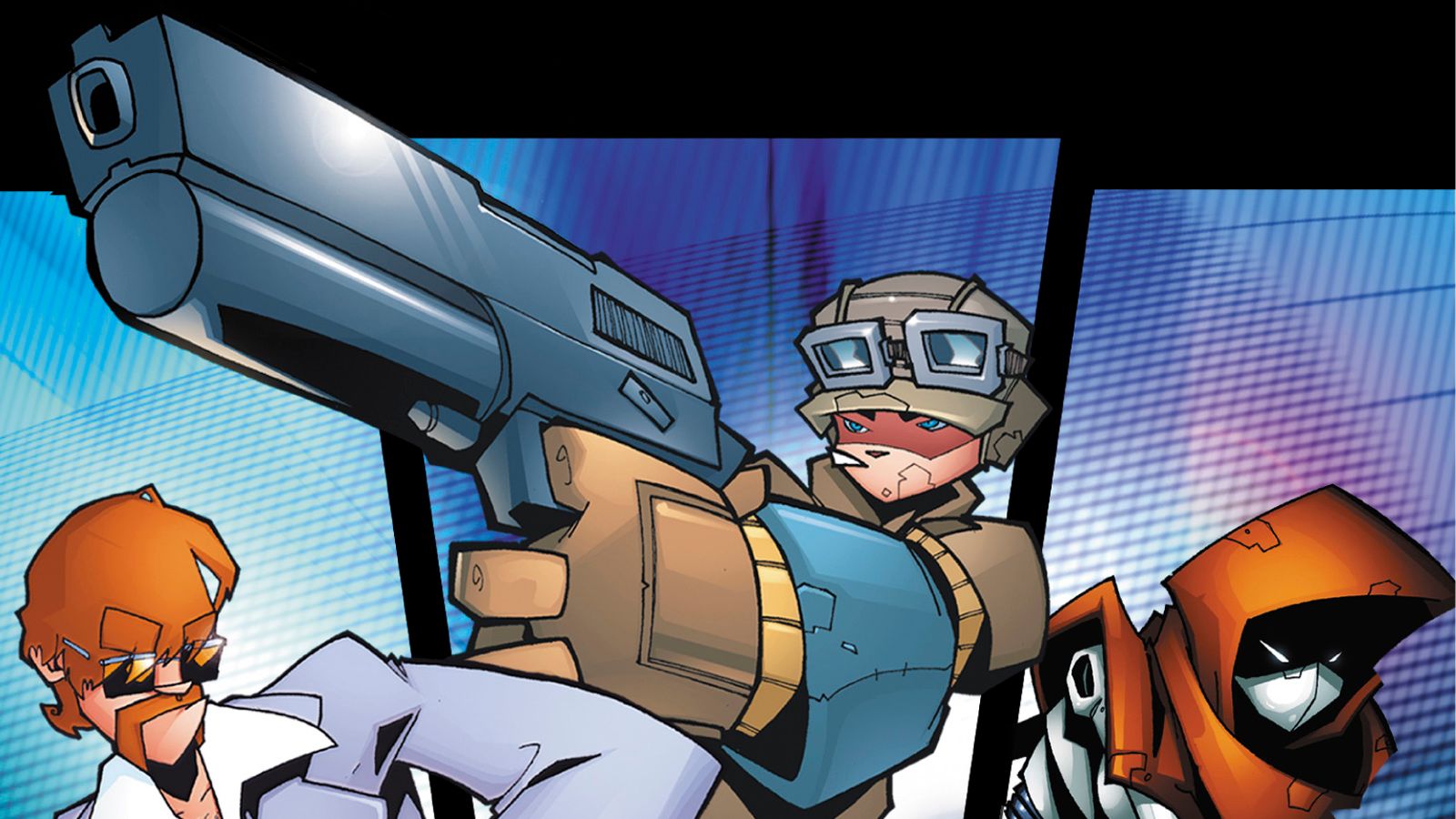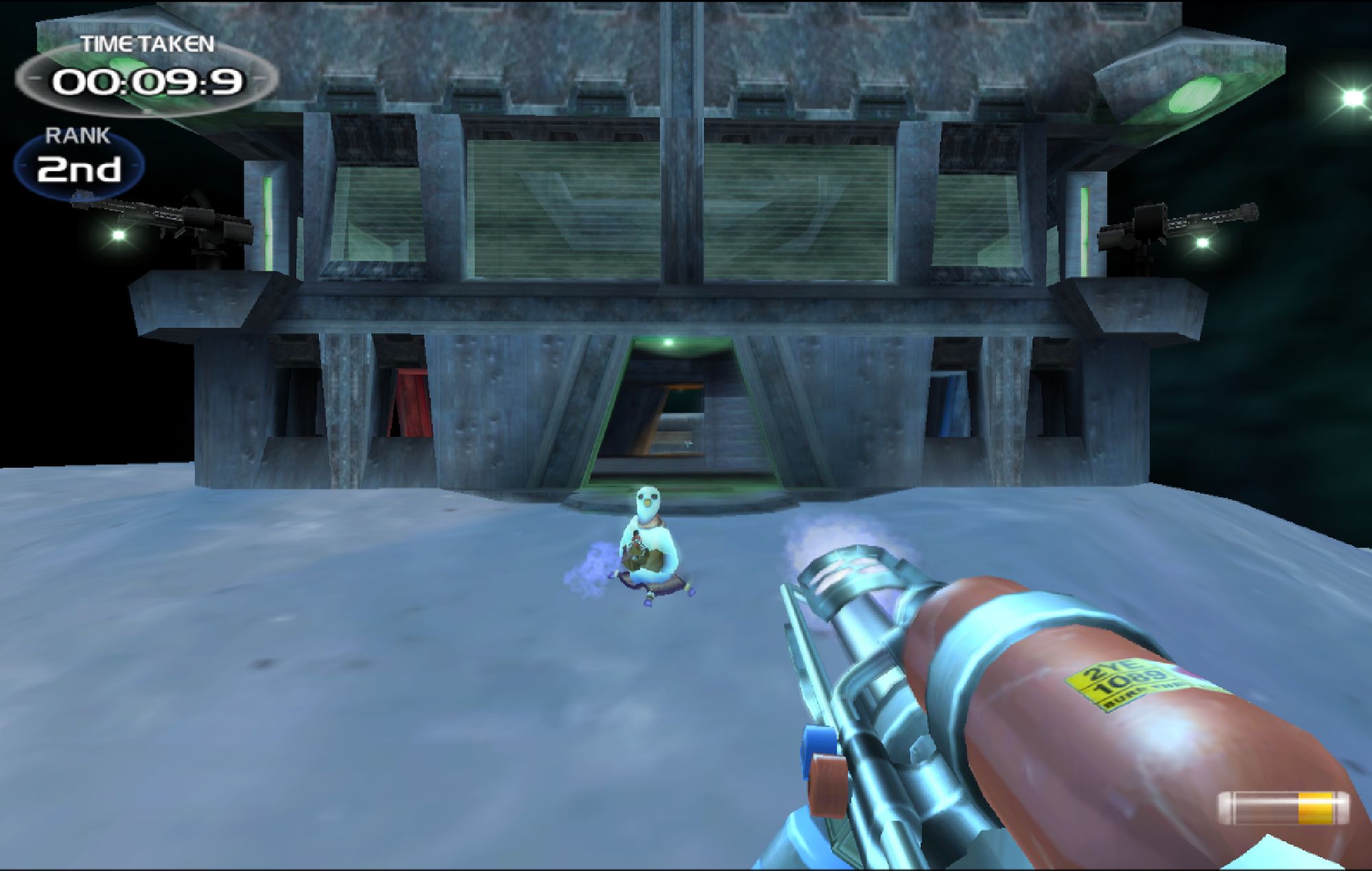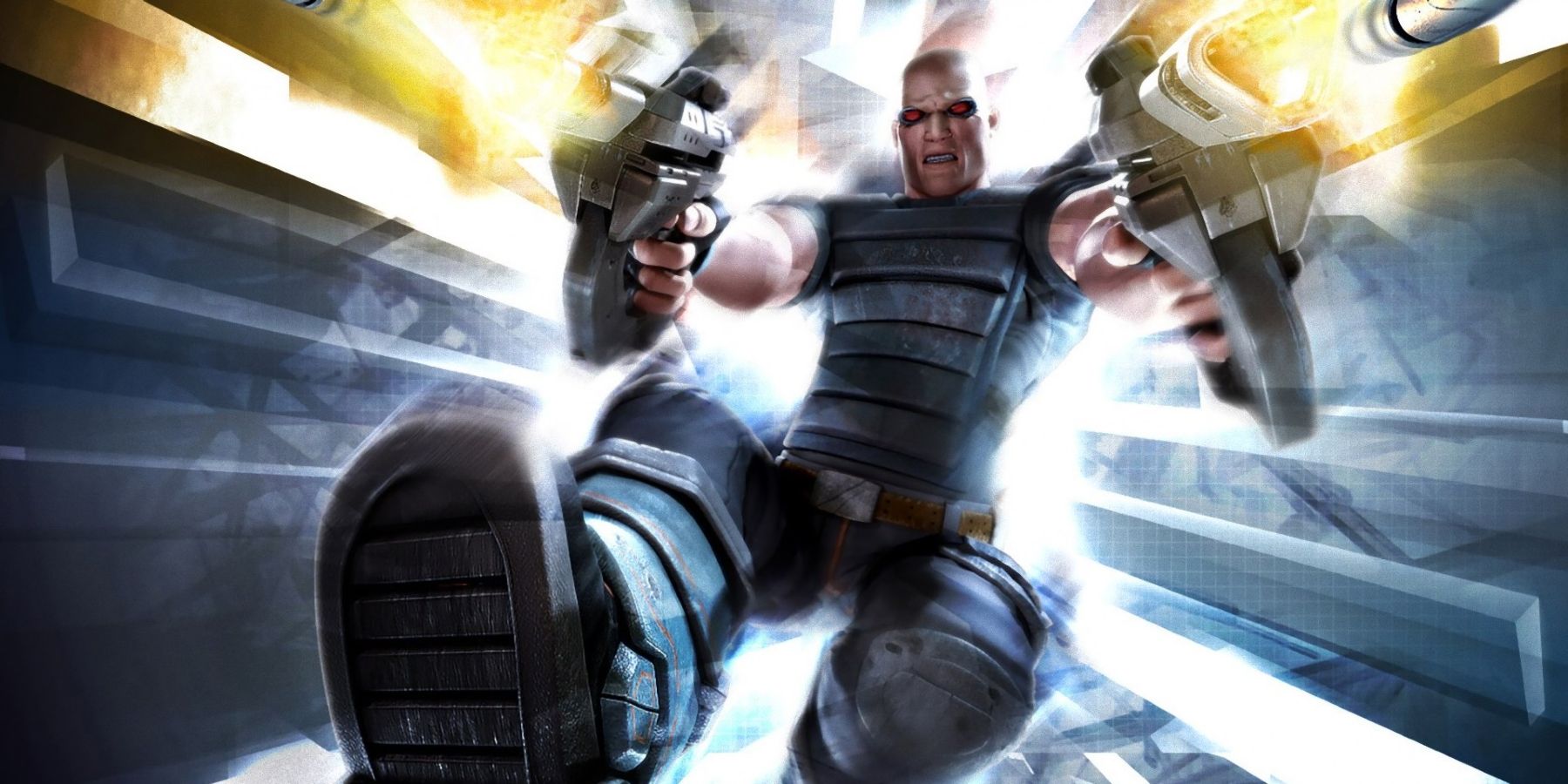
The sixth generation of video game consoles saw the birth of many iconic video game series. Halo, Ratchet & Clank and Call of Duty may be names that immediately come to mind, but the generation is home to a trio of hidden gems that are long overdue a comeback. The TimeSplitters series has been absent for over a decade, yet it still lingers in the minds of both critics and fans.
TimeSplitters' developer, Free Radical Design was founded by former Rare employees who had previously worked on Goldeneye: 007 and Perfect Dark. With such a pedigree, it was bound to produce something of note, and in 2000, it releasedTimeSplitters as a launch title for the PlayStation 2.
The game was a fast-paced and frantic first-person shooter with a multiplayer focus that spanned different time periods. The sheer variety awarded by its setting was a major selling point, allowing a group of friends to fight to the death in a variety of locales as futuristic cyborgs, zombies, gangsters and gingerbread men. The game had a rather bare-bones story mode, as it chose to concentrate on its gameplay.

TimeSplitters also provided challenge modes, unbeatable multiplayer and even a mapmaker where players could construct their own levels. The customization of settings offered when starting a game was unparalleled at the time, and to this day, many shooters still can not compete with what Free Radical was doing in 2000.
Everything the first game achieved was topped in 2002 with TimeSplitters 2. Here, the story mode was expanded, with objective based missions à la Goldeneye providing context to the time-traveling shenanigans. While the original game rarely took itself seriously, the sequel became the true genesis of the series' irreverent British humor. Challenges were expanded and complimented by alternate challenges in arcade leagues, mountains of comical characters and maps joined the fray, and the mapmaker was updated to allow players to create their own levels and challenges.
TimeSplitters 2 is considered by many to be the peak of the series. 2005's Future Perfect changed the gameplay style somewhat, replicating Halo and other shooters of the time as opposed to sticking to the Perfect Dark roots of the the previous games. Still, the third entry is another wonderful shooter experience, boasting an even better and funnier story mode than what came before.
As a series, TimeSplitters was a critical darling of unquestionable quality. However, its sales figures were never truly spectacular. In many ways, the series was ahead of its time; its irreverent style and lightning-fast gameplay would be mirrored in 2016's DOOM and its 2020 sequel DOOM Eternal to resounding success and impressive sales. Even the Snapmap feature of DOOM (2016) felt like a revival of TimeSplitters' Mapmaker.

Cosmetics have proven to be highly sought after by players, with some even willing to pay for them The playable characters of TimeSplitters are some of the finest examples of cosmetics prior to the microtransactions of modern times. It's difficult to look at Fortnite's wide variety of character skins or Overwatch's quirky roster of heroes and not think of what TimeSplitters achieved two decades ago. The series was once considered a risky venture due to its variety and irreverence, but the modern gaming industry is home to many successful games that seem directly inspired by TimeSplitters' ideas.
A fourth TimeSplitters title went into production shortly after the release of Future Perfect and had all the makings of another home run for the studio. Unfortunately, the sequel was ultimately canceled when Free Radical was left bankrupt, after LucasArts pulled the plug on its nearly complete Star Wars Battlefront III. Free Radical was purchased by Crytek in 2009, and as Crytek UK, it went go on to assist with development of Crysis 2, Crysis 3 and Warface.
Crytek was unsure if a fourth entry would be financially viable and opted not to continue development. Then, in 2014 Crytek UK was sold to Deep Silver following a financial crisis and internal restructuring. Now dubbed Dambuster Studios, it would continue working on new title Homefront: The Revolution with Deep Silver. In 2018, THQ Nordic acquired Deep Silver and the TimeSplitters IP. Through all these twists, turns and disappointments, the one thing that never wavered was fans' desire to see TimeSplitters again.
Just this year, it came to light that a 4K port of TimeSplitters 2 was hidden within Homefront: The Revolution by one of its developers, Matt Phillips. Though Phillips himself lost the ability to access the port, upon learning of its existance, the Internet was able to recover the code within several days. The sheer excitement surrounding the discovery of this Easter egg should be enough to demonstrate the passion for the TimeSplitters franchise that still exists.

Alongside the Homefront Easter egg, the other notable appearance by the IP in the last decade has been the fan-made TimeSplitters Rewind, an indie game that has been in development since 2012. The team was given the go-ahead by then-IP owners Crytek to develop the game. Update videos by the developers have been commonly covered by mainstream gaming news outlets, again proving the fanfare surrounding the TimeSplitters name.
The modern gaming landscape is one of both momentous variety and a love of nostalgia. Long dormant franchises such as Crash Bandicoot, Spyro the Dragon and MediEvil have all made successful returns. Plus, the popularity of games with similar elements like Fortnite, Overwatch and DOOM Eternal prove the conditions are perfect for the return of TimeSplitters. While many brilliant FPS games have come and gone since 2005, none have truly captured everything that made TimeSplitters special. That eclectic mix of gameplay, humor and vast content has never been successfully replicated.
Fortunately, the IP is finally back in the hands of its original talent. Steve Ellis, one of the original founders of Free Radical, now leads Dambuster Studios' efforts to revive the franchise. Dambuster is currently comprised of many employees who worked on the original TimeSplitters trilogy, and it seems likely that it will produce a remake, remaster or the long awaited TimeSplitters 4. Whatever the project is, a new TimeSplitters is bound to excite fans once again.
0 Comments